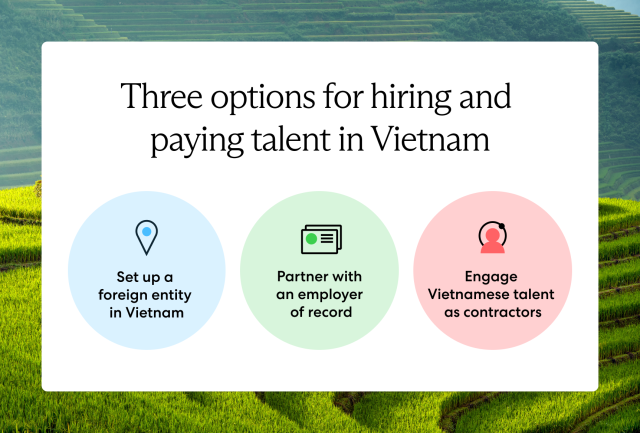Vietnam is one of Asia’s top markets for global expansion. With a strong economy, a growing infrastructure, a well-educated workforce, and favorable policies for global investors, Vietnam provides many opportunities for companies seeking to grow their international talent.
The following guide discusses the options for hiring employees in Vietnam from another country and provides a brief overview of Vietnam's employment laws and regulations. We also explore the risks when hiring internationally and offer solutions to compliantly growing your workforce in Vietnam and beyond.
How do I hire in Vietnam?
There are three ways to hire in Vietnam: set up a legal entity in the country, partner with an employer of record, or engage contractors in Vietnam.

1. Set up a foreign entity in Vietnam
You may choose to set up a foreign entity in Vietnam if you plan to hire a large local team or establish a long-term presence there.
Creating a foreign subsidiary in Vietnam allows your company direct access to the market and full autonomy to compliantly hire talent, run payroll, and handle all employment logistics internally.
However, entity establishment is time-consuming and expensive and requires extensive knowledge of Vietnam’s employment laws and corporate regulations. It’s also not a realistic solution for companies looking for flexible, quick alternatives to engage talent in Vietnam.
2. Partner with an employer of record in Vietnam
As a simpler solution, companies hiring in Vietnam may choose to partner with an employer of record (EOR) in Vietnam to help build their distributed workforce.
An EOR operates as a legal entity and hires and pays employees in Vietnam on your behalf so you can forego entity establishment and mitigate risk.
An EOR partner understands and complies with Vietnam’s employment laws and takes on tasks like onboarding, payroll, taxes, benefits administration, and ongoing compliance with local regulations while you maintain the day-to-day management responsibilities of your team.
Partnering with an EOR is a strategic option that increases speed to market, allows your business to test the waters before significant commitments, and enables you to engage and onboard local employees with lower legal risks.
Learn more: What Is an Employer of Record (EOR)?
3. Engage contractors in Vietnam
Employers may also engage contractors in Vietnam rather than hire permanent employees. A contractor is a self-employed individual that employers can use for short-term projects or specific needs. This method is often a fast and flexible solution that doesn’t require entity establishment.
Still, while building a contingent workforce in Vietnam may seem less risky and more cost-effective than hiring full-time employees, it can lead to severe misclassification risks, which result in back pay, back taxes, and other legal penalties for employers.
Learn more: Should You Hire an Employee or Contractor?
How much does it cost to hire an employee in Vietnam?
The cost of hiring an employee in Vietnam is roughly 23.5% of the employee’s base salary because the employer must contribute 17.5% of the employee’s base salary to social insurance, 3.0% to health insurance, 1.0% to unemployment insurance, and 2% to the local trade union authorities.
Max contributions apply and vary based on the region where the employee lives in Vietnam.
Interested in hiring employees in Vietnam? Use our employee cost calculator below to get reliable insights into employee costs and payroll contributions in Vietnam:
What to know before you hire in Vietnam
Companies hiring employees in Vietnam must comply with the country’s employment laws and regulations. Here’s what you need to know:
Vietnam employment laws
Employers must provide employees in Vietnam with the following employment rights and benefits:
- Employment contracts. Employment contract types in Vietnam include fixed-term and indefinite-term contracts.
- Probationary period. Probationary periods in Vietnam typically range between six and 60 days. A probationary contract must outline the rights and responsibilities of both parties during this period.
- Minimum wage. The Vietnamese government designates four regions for minimum wage. The minimum monthly wages by zone include Zone 1 at VND 4,960,800, Zone 2 at VND 4,409,600, Zone 3 at VND 3,858,400, and Zone 4 at VND 3,445,000.
- Working hours. An employee's working hours cannot exceed 48 hours per week. The Vietnamese government recommends a 40-hour workweek.
- Paid time off. Employees are entitled to a minimum of 12 days of annual leave and earn one additional day for every five years of consecutive service.
- Maternity and paternity leave. Mothers in Vietnam are entitled to six months of maternity leave, which the national social security fund covers. Fathers are allowed to take five days of paid leave. Leave varies for multiple and complicated births.
- Sick leave. Social security in Vietnam also covers sick leave. Employees receive 30 to 60 days of sick leave per year, depending on their social insurance contribution length.
- Termination. Employers must give written notice to the employee at least 45 days in advance of the termination date.
- Severance. Employees are entitled to severance payments upon employment termination. Severance varies based on the employee’s length of service.
- Holidays. Vietnam has 11 public holidays in 2024. The Lunar New Year is a five-day holiday when workers return to their hometowns and local businesses close.
Vietnam payroll regulations
The following information explains key aspects of Vietnam payroll regulations:
Payroll cycle
The payroll cycle in Vietnam is typical monthly for full-time employees. Employers pay their workers on the last working day of the month or as agreed upon in the employment contract for part-time employees and contractors.
13th-month pay
13th-month pay is compensation in addition to an employee’s base annual salary. This extra payment typically equals one month’s salary and is paid out within the financial year.
The 13-month pay cycle is not mandatory in Vietnam but is widely customary and encouraged. Employees in Vietnam expect to receive the 13th-month bonus, called the "Tet bonus," either at the end of the year or during the Tet holiday (Vietnamese New Year).
Employee and employer contributions
Employers and employees in Vietnam must contribute to social security, health insurance, and unemployment insurance funds.
Employers pay 23.5% on top of an employee’s salary, including 17.5% toward social security, 3% for health insurance, 1% for unemployment insurance, and 2% to the Trade Union Fund.
Employees contribute 10.5% of their salary, including 8% to social security, 1.5% to health insurance, and 1% to unemployment.
Interested in expanding to other Asian markets? Learn more: The Top Asian Markets for Global Expansion
Compliance risks when hiring employees in Vietnam from another country
Engaging talent in another country comes with hiring compliance risks. Some common compliance risks to know before engaging local talent in Vietnam include the following:
Varying labor and employment laws
Like in other countries, employment laws regulating items like worker rights, employee entitlements, worker classification, and employment contracts are unique in Vietnam. Employers wanting to hire in Vietnam must do their due diligence to understand and comply with these labor and employment laws to maintain hiring compliance and avoid legal repercussions.
Incorrect payroll contributions
Employers unfamiliar with Vietnam’s payroll tax laws risk making incorrect payroll contributions and negatively impacting their employee’s take-home pay. They may also face back pay, tax issues, and fines for payroll compliance errors.
Worker misclassification
If you engage contractors instead of hiring employees in Vietnam, you may risk worker misclassification.
Worker classification determines whether an employer must withhold and remit taxes on behalf of their talent and provide them with statutory benefits. For example, employers withhold taxes from an employee’s salary and provide them with statutory benefits, while contractors pay a self-employment tax and don’t receive benefits from their clients.
If you fail to classify employees and contractors correctly, you are liable for back pay for unpaid wages, benefits, and social security contributions. You may also face other legal fines and reputational damage.
Read our complete guide to employee and contractor misclassification.
Permanent establishment
Permanent establishment occurs when a company generates revenue from a fixed physical or virtual location and regularly conducts business there. If your business has an ongoing presence in Vietnam, you may have a permanent establishment and be liable to local corporate taxes.
If you fail to understand and identify your permanent establishment in Vietnam, your company risks noncompliance penalties and liabilities, such as paying back unpaid taxes and interest.
Immigration requirements
You may face a scenario where you want to hire a foreign national in Vietnam or relocate an international employee to the country. In these cases, you must understand and comply with Vietnam’s immigration requirements to ensure your employees can live and work in the country legally.
Simplify hiring employees in Vietnam with Velocity Global
If you seek to hire in Vietnam, the hassles of entity establishment and complying with international employment laws shouldn’t get in your way.
Instead, work with an EOR partner like Velocity Global, which gives you legal peace of mind, an expert services team, and a single platform to simplify global workforce management and navigate local employment laws easily.
Velocity Global's EOR solution handles onboarding, payroll, benefits administration, immigration, and compliance so you can flexibly hire top talent in Vietnam without having to set up an entity or navigate complex labor and tax laws.
Contact us to learn how we can support you and your growing workforce in Vietnam and more than 185 countries.
Topic:
Country Guides



